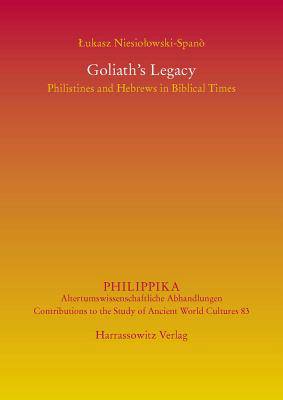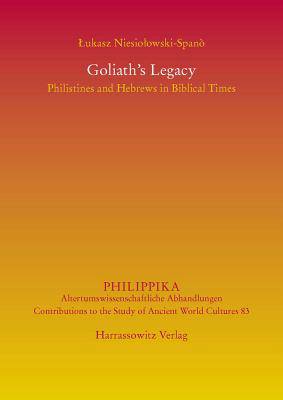
Je cadeautjes zeker op tijd in huis hebben voor de feestdagen? Kom langs in onze winkels en vind het perfecte geschenk!
- Afhalen na 1 uur in een winkel met voorraad
- Gratis thuislevering in België vanaf € 30
- Ruim aanbod met 7 miljoen producten
Je cadeautjes zeker op tijd in huis hebben voor de feestdagen? Kom langs in onze winkels en vind het perfecte geschenk!
- Afhalen na 1 uur in een winkel met voorraad
- Gratis thuislevering in België vanaf € 30
- Ruim aanbod met 7 miljoen producten
Zoeken
Goliath's Legacy
Philistines and Hebrews in Biblical Times, Translated from Polish by Maria Kantor
Lukasz Niesiolowski-Spano
Hardcover | Engels
€ 153,45
+ 306 punten
Omschrijving
In the 12th century BCE revolutionary changes and major population movements took place in the eastern Mediterranean. One element of this complex process was the appearance of the warlike Sea Peoples on the coast of the Middle East. Among the groups that we know of the most important seem to be Philistines. It is no accident that the name of the region - Palestine - comes precisely from this ethnonym. The book examines the impact of the Sea Peoples, especially the Philistines, on the local population, and on the Hebrews in particular. To determine the chronological sequence, the first part presents the biblical narrative in a synthetic way, and thus the Philistines' role in the history of Israel and Judah. These considerations complement the study of geography, in which toponyms are discussed to establish a range of the Philistines' impact. Concerning the likely duration of an impact of the Philistines on the Hebrews, two periods were suggested: the early Iron Age (ca. 1150-900 BCE) and the domination of Assyria (ca. 750-650 BCE). The second part of the book discusses the culture of the Hebrews, known from the Bible, which may have its roots in the Philistines' heritage. These phenomena are divided into thematic groups. The impact of the Philistines on the Hebrews was much larger than previously thought, and it was not connected only with Judah's and Israel's response to the presence of a hostile neighbor. Several components of Hebrew culture and some literary motifs in the Bible seem to derive specifically from the Philistines' culture.
Specificaties
Betrokkenen
- Auteur(s):
- Vertaler(s):
- Uitgeverij:
Inhoud
- Aantal bladzijden:
- 321
- Taal:
- Engels
Eigenschappen
- Productcode (EAN):
- 9783447103466
- Verschijningsdatum:
- 25/02/2016
- Uitvoering:
- Hardcover
- Formaat:
- Genaaid
- Afmetingen:
- 170 mm x 239 mm
- Gewicht:
- 557 g

Alleen bij Standaard Boekhandel
+ 306 punten op je klantenkaart van Standaard Boekhandel
Beoordelingen
We publiceren alleen reviews die voldoen aan de voorwaarden voor reviews. Bekijk onze voorwaarden voor reviews.









